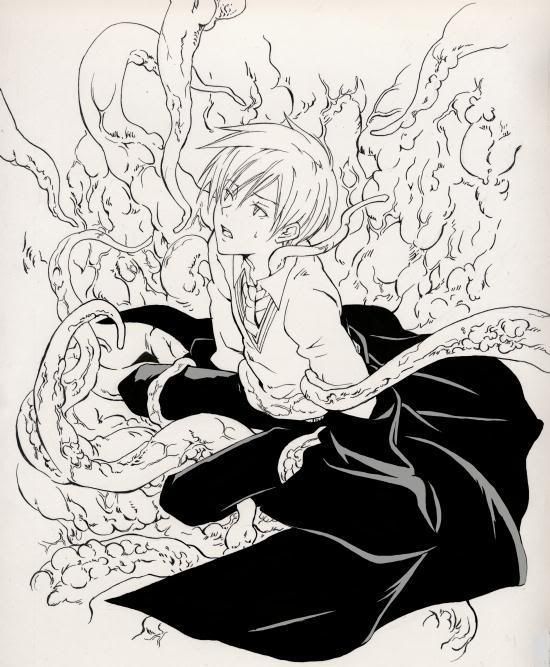Hentai tentacular -Tentacle rape-
Published Thursday, November 03, 2005 by Spyder | E-mail this postSi dentro de sus parafilias está la octofilia, tal vez les interese este artículo de la wikipedia, sobre las violaciones tentaculares tan comunes en el hentai japonés.
Tentacle rape
Vía Wikipedia
Tentacle rape is a concept found in some horror hentai titles, where various tentacled creatures (usually fictional monsters) rape or otherwise penetrate young, big-breasted women (or, less commonly, men). Much of the genre also consists of domination/humiliation and bondage fetishes, since the "victim" is typically restrained by the appendages. Biological justifications are sometimes given; the tentacle creature may be described as a parasite who deposits its eggs into a female for breeding. In other unlikely scenarios the creature outright impregnates its victim.
Tentacled creatures appeared in Japanese erotica long before animated pornography; among the most famous of the early instances (and perhaps the first) is a Hokusai (the original creator of the word manga) woodcut called The Dream of the Fisherman's Wife, depicting a woman sexually entwined with a pair of octopuses. This woodcut arose in the Edo period in Japan when Shinto was making a resurgence; the resulting animism and a more playful attitude to sexuality combined powerfully in Hokusai's piece. It is a celebrated example of shunga and has been reworked by a number of artists. Australian artist David Laity reworked the woodcut into a painting of the same name, and Masami Teraoka brought the image up to date with his 2001 work "Sarah and Octopus/Seventh Heaven", part of his Waves and Plagues collection.
Another example of pre-animation tentacle porn is the 1933 sci-fi short story "Shambleau" by author C.L._Moore. While the creature in the story is more vampiric than licentious, the elements of the narrative would be recognizable to anyone familiar with the genre.
Toshio Maeda's manga Urotsukidoji created what might be called the "modern paradigm" of tentacle porn, in which the elements of sexual assault are emphasized. Maeda explained that he invented the practice to get around strict Japanese censorship regulations, which prohibit the depiction of the penis but apparently do not prohibit showing sexual penetration by a tentacle or similar (often robotic) appendage.
Examples include:
The Urotsukidoji Saga — Started in 1987, the Overfiend series is the most well-known title in the genre.
La Blue Girl — a series of films that moved from animation to live action. Famous for being refused translation outright by the British censor.
Injukyoshi ("Obscene Beast Teacher") — a live action film.
Alien from the Darkness and Advancer Tina — Hentai films about female explorers battling tentacled aliens.
At times, the genre also seems to exploit the more controversial realms of bodice ripper genre, particularly rape fantasies, with the "safety" that the scenes being depicted are so absurd or fanciful they do not have parallels in the real world. Some fans see it as the extreme of bodice-ripping stories, although the rape fantasy genre is seen more critically in the West than in native Japan.
The topic is also ripe for parody, as shown by the following:
alt.sex.cthulhu and a range of other Cthulhu-related web pages
Many different web comics and cultural groups on the internet reference "tentacle pr0n" in a humorous way. An example is Ghastly's Ghastly Comic, in which it is a frequently recurring topic.
"The Lighter Side of Tentacle Hentai", from Sexy Losers




0 Responses to “Hentai tentacular -Tentacle rape-”
Leave a Reply